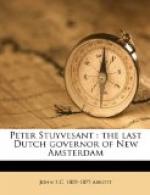“One thing is certain, that there was a high tone prevailing at that time, which is now nowhere to be seen. The community then looked up to public men, with a degree of reverence which has never been felt by those who have succeeded them. They were the last of a race which does not now exist. With them died the stateliness of colonial times. Wealth came in and created a social distinction which took the place of family; and thus society became vulgarized.
“The influences of the past are fast vanishing away, and our children will look only to the shadowy future. The very rule by which we estimate individuals has been entirely altered. The inquiry once was, ‘Who is he?’ Men now ask the question, ‘How much is he worth?’ Have we gained by the change?”
THE END.
NOTES:
[Footnote 1: Winslow in Young (p. 371).]
[Footnote 2: Bradford in Prince, 248.]
[Footnote 3: Dutch miles, equal to sixteen English miles.]
[Footnote 4: Morton’s memorial, page 176.]
[Footnote 5: Hist. of New York, by John Romeyn Brodhead. Vol. I, p 257.]
[Footnote 6: History of the State of New York, p. 203.]
[Footnote 7: History of the State of New York, By John Romeyn Brodhead Vol I. p. 473.]
[Footnote 8: John Romeyn Brodhead, Vol. 1. p. 521. E.B. O’Callaghan. M D Vol 2. p. 157.]
[Footnote 9: “History of New Netherland” by E.B. O’Callaghan, Vol 2. p. 317]
[Footnote 10: Officers of a very important municipal court.]
[Footnote 11: See Brodhead’s State of New York, vol. 1. p. 721; also O’Callaghan’s New Netherland, vol 2. p. 489.]
[Footnote 12: This was one cent and a half for the three, or half a cent each.]



